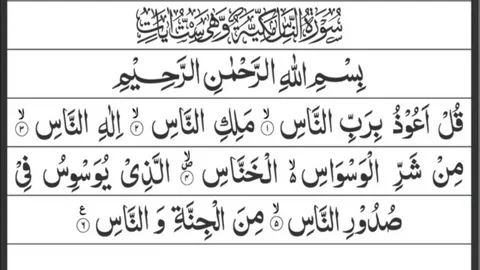Surah Naas is one of the most frequently recited chapters of the Quran, and for good reason. As the last Surah in the Quran, it holds a special place in the hearts of Muslims around the world. Surah Naas is a short but powerful chapter that serves as a shield against evil, bringing peace and protection to those who recite it. Understanding Surah naas benefits not only enriches our spiritual lives but also provides us with practical tools to navigate the challenges of life.
What is Surah Naas?

Surah Naas is the 114th chapter of the Quran and consists of just six short verses. Despite its brevity, its significance cannot be overstated. The chapter is a direct plea for protection from all forms of evil, both seen and unseen. The term “Naas” means “mankind,” reflecting the universal nature of its message.
Historical Context and Revelation
Surah Naas, along with Surah Falaq, is known as one of the “Mu’awwidhatayn” (the two chapters of refuge). These Surahs were revealed together and are often recited together for protection. According to Islamic tradition, the Prophet Muhammad (peace be upon him) was afflicted by a spell of black magic, and these Surahs were revealed as a means to seek refuge and break the spell. The story underscores the powerful role of these Surahs in offering protection from harm.
Position in the Quran
Being the final chapter of the Quran, Surah Naas serves as a closing reminder of the constant need for divine protection. Its placement at the end of the Quran is symbolic, encapsulating the essence of seeking refuge in Allah as the ultimate protector against all forms of evil.
Connection to Surah Falaq
Surah Naas and Surah Falaq are often mentioned together due to their similar themes of seeking protection. While Surah Falaq focuses on external threats like darkness, envy, and witchcraft, Surah Naas zeroes in on internal and unseen dangers, particularly those posed by Shaitan (Satan). Reciting both Surahs together offers comprehensive protection against all types of harm.
Surah naas benefits

One of the primary benefits of Surah Naas is its role as a spiritual shield. The Surah is essentially a prayer for refuge in Allah from the evil of all creation, particularly from the whispers and deceit of Shaitan.
Shield Against Shaitan (Satan)
Surah Naas specifically asks for protection from “the evil of the whisperer who withdraws” (Quran 114:4). This refers to Shaitan, who is known for his subtle, insidious influence on the hearts and minds of people. Reciting Surah Naas regularly helps in warding off these negative whispers, strengthening one’s resolve to stay on the righteous path.
Safeguard from Black Magic
Given its historical context, Surah Naas is also widely regarded as a safeguard against black magic. The Surah was revealed in part to protect the Prophet Muhammad (peace be upon him) from a spell, making it a potent tool for anyone seeking divine protection from similar harms.
Calming the Mind and Heart
In addition to its protective qualities, Surah Naas has a calming effect on the reciter. The act of seeking refuge in Allah creates a sense of peace and reassurance, which can be particularly beneficial in moments of anxiety, fear, or uncertainty. The Surah reminds believers that no matter what challenges they face, Allah is their ultimate protector.
Enhancing One’s Faith and Tawakkul (Reliance on Allah)
Regular recitation of Surah Naas can also strengthen one’s faith and reliance on Allah. By consistently seeking refuge in Him, believers reaffirm their trust in His protection and power. This enhanced tawakkul helps in cultivating a mindset of spiritual resilience and confidence in the face of adversity.
Practical Benefits of Surah Naas
Incorporating Surah Naas into your daily routine is a simple yet effective way to ensure constant spiritual protection. Many Muslims make it a habit to recite Surah Naas, along with Surah Falaq and Surah Ikhlas, at the end of their five daily prayers. This practice forms a spiritual armor that shields them throughout the day and night.
Recitation for Children’s Safety
Parents often recite Surah Naas over their children, particularly before they sleep. This is done to protect them from harm, nightmares, and the influence of evil. It’s a common practice in many Muslim households to recite this Surah, either directly over the children or into their hands, which are then wiped over their bodies for protection.
Use in Ruqyah (Islamic Healing)
Ruqyah, the practice of reciting Quranic verses for healing and protection, frequently includes Surah Naas. Whether for protection from jinn, evil eyes, or any form of spiritual harm, Surah Naas is a key component of many Ruqyah rituals. Its inclusion underscores its importance in seeking divine intervention in healing.
Aid in Overcoming Anxiety and Fear
For those struggling with anxiety or fear, reciting Surah Naas can be particularly beneficial. The Surah’s emphasis on seeking refuge in Allah provides a spiritual coping mechanism that helps alleviate these feelings. It serves as a reminder that all fears and anxieties are within Allah’s control, and that seeking His protection can bring comfort and peace.
How to Incorporate Surah Naas into Daily Life
While Surah Naas can be recited at any time, there are certain times when its recitation is particularly recommended. These include:
- Morning and Evening: Reciting Surah Naas as part of the morning and evening supplications (adhkar) is a common practice. This ensures protection throughout the day and night.
- Before Sleeping: Reciting Surah Naas before sleeping is advised to protect against nightmares and any harm that might come during the night.
Incorporating in Morning and Evening Adhkar (Supplications)
Including Surah Naas in your morning and evening adhkar is an excellent way to start and end the day with a sense of spiritual protection. Many Muslims have a set routine of adhkar, and Surah Naas is a staple in these practices. It’s a simple addition that brings immense benefits.
FAQs
How many times should Surah Naas be recited daily?
There is no fixed number, but it is commonly recited three times in the morning and evening, along with Surah Falaq and Surah Ikhlas, as part of daily adhkar.
Can Surah Naas be recited for physical ailments?
Yes, Surah Naas can be included in Ruqyah for both spiritual and physical healing. It’s believed to offer protection and healing from various forms of harm.
What is the significance of pairing Surah Naas with Surah Falaq?
Pairing Surah Naas with Surah Falaq offers comprehensive protection, covering both external and internal threats. Together, they are a powerful spiritual shield.
Is there a specific reward for reciting Surah Naas?
While the exact reward is known only to Allah, it’s widely understood that regular recitation of Surah Naas brings divine protection and strengthens one’s faith.
Can Surah Naas protect against nightmares?
Yes, reciting Surah Naas before sleeping is a common practice to protect against nightmares and other night-time disturbances.
Conclusion
Surah Naas is much more than just a short chapter of the Quran; it’s a powerful tool for spiritual and practical protection. Its benefits extend from shielding against the whispers of Shaitan to providing a sense of calm and reassurance in times of anxiety. By incorporating Surah Naas into your daily life, you not only protect yourself from various forms of harm but also strengthen your connection with Allah. Make it a habit to recite Surah Naas regularly, and experience the profound peace and protection it brings.


